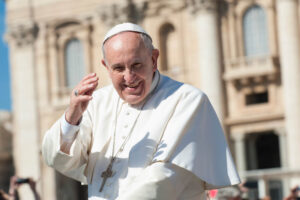Last Updated on July 25, 2024 by Dave Schoenbeck
Just before Christmas in 2013, Pope Francis shocked his Vatican leadership with a blistering, in-your-face indictment of the church’s leadership. In his speech, he outlined the “15 Ailments of the Curia,” which specifically addressed the aberrant behaviors that he believes cause the Catholic church to lose focus on its fundamental mission.
In his eyes, the culture of the Vatican bureaucracy empowered the Cardinals, Bishops, and Priests to use their careers to grab power and wealth. He spoke about their “ hypocritical double lives,” the “back-stabbing culture,” and their collective “spiritual Alzheimer’s forgetting what drew them to the priesthood in the first place.” He further stated that the organization has an “ailment of feeling immortal, immune, and even indispensable.” Another quote was, “The terrorism of gossip can kill the reputation of our colleagues and become a cancer that threatens the harmony of the body.” Outspoken critics of the church have commented that the previous Popes had been distracted by their personal missions and delegated the running of this enormously complex organization to Vatican lieutenants.
I am not a Catholic, so I can’t claim to understand the inner workings of the church. Still, I think you will agree that it is infrequent to read about the CEO of a vast organization/empire delivering such a powerful, violent, strongly-worded challenge like this. If this happened at Apple, Boeing, the Dallas Cowboys, or Chase Manhattan Bank, the media talking heads would be on it for weeks. Employees would be polishing their resumes, checking job websites, and pointing fingers at others.
The news reports said that Vatican members present for the Pope’s seismic speech sat stone-faced, with little applause or affirmations. I guess they were boiling inside with anger and fear of getting called out in public when this was not the historical way to drive change. Seeing how they embrace the Pope’s new behavioral expectations will be exciting.
I am writing about this today because there are some incredible lessons about culture and driving change for those who own and run a business.
Driving Change: My 3 Takeaways from the Pope’s Speech
- Don’t Underestimate the power of culture: If you aren’t defining and driving the culture in your business, someone else is, and it probably isn’t the people you would choose. Your company’s culture is a living organism that needs cultivation, feeding, nurturing, and tough love. A great culture is the genesis of success and profitability. Hundreds of examples of companies with unique business models and lousy cultures exist. Most have failed or are dying. Conversely, businesses with a robust culture and identity can excel in a crowded, competitive marketplace.
- Motivating people to change requires massive energy: Just describing what you want a few times doesn’t make things happen. Most people hate change and will fight you and your new ideas & initiatives like a cornered dog. Effectively driving change involves overtly and frequently communicating what you want and expect. If you need your team to have a different attitude or do other things, dancing around the issue and politely asking for their help is a feeble and ineffective way to get it done. Be bold. Be aggressive. Be the boss.
- Lead from the top and roots: Pope Francis, as you should, led from the top. However, enlisting the influence leaders in your organization to adopt and model the new behavior is critical for successfully driving change. After you throw down the challenge gauntlet, gather your supporters and essential people to help you make this happen within the company. When the naysayers see their friends adapting, they will come along for the ride.
To learn more about driving change and success in your business, please click here to receive my eBook, “The 10 Critical Responsibilities of a Business Owner.”
Coach Dave
- What is Neuro-Linguistic Programming and What is the Impact on Your Business? - October 23, 2025
- If You Are Considering Starting a Business, Read the Book The E-Myth Revisited First - October 16, 2025
- Here’s a Must-Read Book: The Four Disciplines of Execution - October 9, 2025



